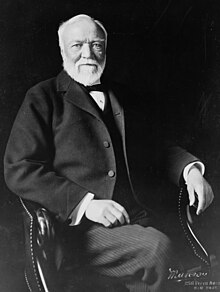
Back Andrew Carnegie Afrikaans أندرو كارنيغي Arabic اندرو كارنيجى ARZ Andrew Carnegie AST Endrü Karnegi Azerbaijani Эндрю Карнеги Bashkir Андрю Карнеги Bulgarian এন্ড্রু কানের্গি Bengali/Bangla Andrew Carnegie Catalan Andrew Carnegie Czech
Andrew Carnegie | |
|---|---|
 Carnegie in 1913 | |
| Born | November 25, 1835 Dunfermline, Fife, Scotland |
| Died | August 11, 1919 (aged 83) Lenox, Massachusetts, U.S. |
| Resting place | Sleepy Hollow Cemetery, Sleepy Hollow, New York, U.S. |
| Occupation(s) | Industrialist, Philanthropist |
| Known for | Founding and leading the Carnegie Steel Company Founding the Carnegie Library, Carnegie Hall, Carnegie Institution for Science, Carnegie Corporation of New York, Carnegie Endowment for International Peace, Carnegie Mellon University, Carnegie Trust for the Universities of Scotland, Carnegie United Kingdom Trust, Carnegie Foundation for the Advancement of Teaching, Carnegie Council for Ethics in International Affairs, Carnegie Museums of Pittsburgh, and the Carnegie Hero Fund |
| Political party | Republican[1] |
| Spouse | |
| Children | Margaret Carnegie Miller |
| Parent(s) | William Carnegie Margaret Morrison Carnegie |
| Relatives | Thomas M. Carnegie (brother) George Lauder (first cousin) George Lauder Sr. (uncle) |
| Signature | |

Andrew Carnegie (English: /kɑːrˈnɛɡi/ kar-NEG-ee, Scots: [kɑrˈnɛːɡi];[2][3][note 1] November 25, 1835 – August 11, 1919) was a Scottish-American industrialist and philanthropist. Carnegie led the expansion of the American steel industry in the late 19th century and became one of the richest Americans in history.[5] He became a leading philanthropist in the United States, Great Britain, and the British Empire. During the last 18 years of his life, he gave away around $350 million (roughly $6.5 billion in 2023),[6] almost 90 percent of his fortune, to charities, foundations and universities.[7] His 1889 article proclaiming "The Gospel of Wealth" called on the rich to use their wealth to improve society, expressed support for progressive taxation and an estate tax, and stimulated a wave of philanthropy.
Carnegie was born in Dunfermline, Scotland, and immigrated to what is now Pittsburgh, Pennsylvania, United States with his parents in 1848 at the age of 12. Carnegie started work as a telegrapher, and by the 1860s had investments in railroads, railroad sleeping cars, bridges, and oil derricks. He accumulated further wealth as a bond salesman, raising money for American enterprise in Europe. He built Pittsburgh's Carnegie Steel Company, which he sold to J. P. Morgan in 1901 for $303,450,000 (equal to $11,113,550,000 today);[8] it formed the basis of the U.S. Steel Corporation. After selling Carnegie Steel, he surpassed John D. Rockefeller as the richest American of the time.[9]
Carnegie devoted the remainder of his life to large-scale philanthropy, with special emphasis on building local libraries, world peace, education, and scientific research. He funded the Carnegie Hall in New York City, the Peace Palace in The Hague, founded the Carnegie Corporation of New York, Carnegie Endowment for International Peace, Carnegie Institution for Science, Carnegie Trust for the Universities of Scotland, Carnegie Hero Fund, Carnegie Mellon University, and the Carnegie Museums of Pittsburgh, among others.
- ^ "Andrew Carnegie". Encyclopedia.com. Archived from the original on September 7, 2016. Retrieved March 31, 2016.
- ^ "Columbia Electronic Encyclopedia". November 25, 1835. Archived from the original on June 30, 2020. Retrieved June 29, 2020.
- ^ "Merriam-Webster Dictionary". Archived from the original on June 30, 2020. Retrieved June 29, 2020.
- ^ Pollak, Michael (June 20, 2004). "F.Y.I." No. National Edition. New York City: The New York Times Company. New York Times. p. 2; Section 14. Archived from the original on April 21, 2019. Retrieved October 22, 2020.
- ^ listed at 372 billion 2014 USD by Jacob Davidson, time.com The 10 Richest People of All Time "Rockefeller gets all the press, but Andrew Carnegie may be the richest American of all time. The Scottish immigrant sold his company, U.S. Steel, to J. P. Morgan for $480 million in 1901. That sum equates to slightly over 2.1 percent of U.S. GDP at the time, giving Carnegie an economic power equivalent to $372 billion in 2014."
- ^ "CPI Inflation Calculator". www.bls.gov. Archived from the original on July 5, 2018. Retrieved October 15, 2020.
- ^ "Andrew Carnegie's Legacy". Archived from the original on October 16, 2012.
- ^ Hawke, David Freeman (1980). John D. The Founding Father of the Rockefellers. Harper & Row. p. 210. ISBN 978-0060118136.
- ^ BBC (September 18, 2023). "Andrew Carnegie: Gold key gift celebrates theatre makeover". BBC News.
Cite error: There are <ref group=note> tags on this page, but the references will not show without a {{reflist|group=note}} template (see the help page).
© MMXXIII Rich X Search. We shall prevail. All rights reserved. Rich X Search